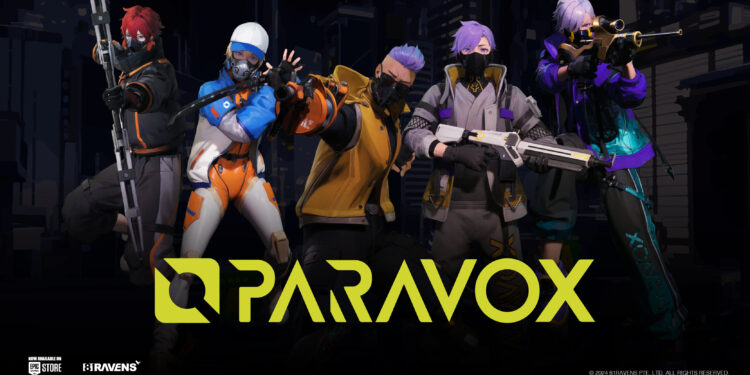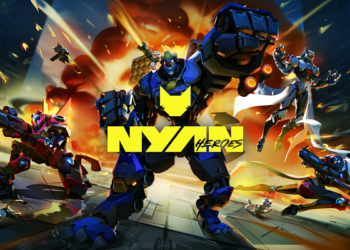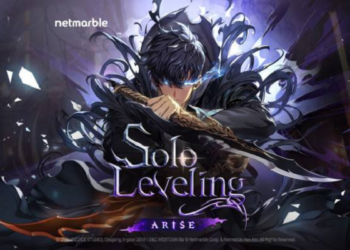Paravox is revolutionizing esports by using blockchain technology to break free from publisher control, empower the community, and introduce custom tokenomics, creating a new era where players and teams will thrive.
Esports, once a niche pastime, has now become a global phenomenon. However, one of the biggest challenges that haunts esports tournaments and its international nature is strict publisher control. New models that break free from traditional publisher control are being introduced thanks to decentralization and blockchain technology.
In an exclusive interview, Go, Yoshida, former head of Oasis Layer 2 and current leader at 81 Ravens, reveals how their innovative game Paravox and its blockchain-based solutions offer a path to democratize esports. Yoshida envisions a new era for competitive gaming by eliminating publisher dominance and empowering communities.
The Problem with Publisher Control in Esports
A critical issue that has long stifled the growth of esports is the overwhelming power game publishers hold. Unlike traditional sports such as soccer or basketball, where no single entity owns the game, the esports ecosystem is primarily controlled by publishers who dictate the terms of tournament organization, monetization, and player participation.
According to Yoshida, “You need to get approvals from the publisher to hold events, tournaments, or even monetize content. There’s always a bottleneck that requires publisher permission.”
This centralized structure has created significant barriers to innovation. Yoshida stresses that the lack of autonomy for esports organizations, teams, and players has stunted the industry’s organic growth, preventing it from fully realizing its potential on a global scale.
Incentive Gaps: A Barrier to Esports Growth
Beyond publisher control, Yoshida identifies a significant issue contributing to the esports industry’s stagnation: the lack of proper incentive structures for key stakeholders. Tournament organizers, content creators, and esports teams often find it difficult to monetize their efforts sustainably, limiting their ability to innovate and grow within the ecosystem.
“Many struggle to find viable ways to monetize their efforts, which limits the industry’s ability to scale. The esports ecosystem cannot reach its full potential without sustainable financial incentives, and many talented individuals are left without a means to participate in its growth,” said Yoshida.
“The ecosystem doesn’t provide enough reward for those who contribute at the grassroots level,” Yoshida explains. This gap in incentive models is holding back many passionate individuals from entering or staying in the esports space. The esports industry faces a continued lack of growth and vitality without proper rewards for community-driven content and team-building.
Blockchain-Powered Solutions: Paravox Breaks the Mold
In response to these challenges, Yoshida and his team at 81 Ravens have created Paravox, combining the best of blockchain technology with an open and decentralized game design. Paravox removes traditional publisher barriers, offering an open Intellectual Property (IP) model where anyone can organize tournaments, secure sponsorships, and utilize the game’s assets to foster community-driven events. This radical departure from the publisher-centric model creates new opportunities for esports organizers, content creators, and players to thrive.
Unlike most competitive games that restrict the use of assets and event organization, Paravox empowers individuals and organizations to run tournaments and monetize their activities without publisher approval. Yoshida’s team actively promotes this open IP model, encouraging a more flexible and dynamic esports environment. “We’re allowing the community to drive the game’s future, and that freedom is a game-changer for the esports industry.”
This approach decentralizes event organization and gives players and teams the autonomy to create monetization strategies. By removing publisher control, Paravox enables more organic growth within the esports community, paving the way for a more inclusive and diverse competitive gaming scene.
Blockchain Integration: Secure Ownership and Custom Tokenomics
At the heart of Paravox lies its blockchain integration, which redefines the relationship between players and in-game assets. In traditional esports models, players’ digital items, such as skins and collectibles, are tied to centralized servers, offering little control or ownership. Paravox addresses this by placing all in-game items on the blockchain, ensuring players have actual ownership of their digital assets.
With blockchain technology, players can trade and sell their items on decentralized marketplaces, giving them the power to monetize their digital assets freely. Furthermore, the custom tokenomics integrated into Paravox ensures that participants are rewarded fairly for their contributions, whether they are players, content creators, or event organizers. This blockchain-powered system fosters a sustainable and equitable economic model where everyone involved can benefit from the growing esports ecosystem.
Community Empowerment: A New Era for Esports
The ultimate goal of Paravox is to empower the esports community by returning ownership to players and organizers. Yoshida believes that this new approach will make esports more inclusive but will also help foster new business opportunities for enterprises to thrive within the ecosystem. By allowing users to monetize their participation, Paravox creates a self-sustaining environment where players, teams, and organizers are incentivized to keep the community and its competitive landscape growing.
The decentralized nature of Paravox also makes it easier for new players and entrepreneurs to enter the space. As more people gain control over their digital assets and have access to a broader range of monetization opportunities, esports become more accessible and open to a wider audience.
Since its April launch, Paravox has attracted over 100,000 users, primarily from the traditional gaming space (Web2), signaling strong demand for a decentralized model. Esports organizations like Zeta Division from Japan and Loud from Latin America have already established teams for the game, signaling growing institutional acceptance of Paravox and its community-centric approach.
This early success indicates a larger trend within the esports community, where players and organizations are looking for new ways to engage, earn, and innovate within a rapidly evolving landscape. Yoshida and his team are hopeful that as more organizations join, Paravox will continue to grow and develop, helping to push the boundaries of what esports can be.
Overcoming Startup Challenges
Despite its promise, Paravox is not without challenges. As a startup, 81 Ravens must compete with established publishers with far greater resources and infrastructure. Yoshida acknowledges the difficulties in competing with industry giants but believes that leveraging existing relationships, focusing on resource allocation, and maintaining a clear strategic vision will help overcome these hurdles.
Additionally, integrating Web3 technologies into a game requires technical expertise. Yoshida’s team has proactively partnered with blockchain specialists to ensure smooth integration. The legal complexities surrounding blockchain gaming, such as intellectual property and regulations, also require careful attention, and 81 Ravens are working closely with legal advisors to navigate these challenges.
Looking ahead, Paravox could serve as the blueprint for a new model of esports that prioritizes community ownership and sustainable growth over publisher control. By leveraging blockchain technology, Paravox addresses the key issues of publisher monopolies, lack of incentive models, and centralized control. This paradigm shift could reshape how esports organizations, players, and content creators interact with the industry, making it more inclusive and empowering.
As Paravox continues to evolve, Yoshida and his team hope their model will pave the way for the future of esports, where control rests firmly in the hands of the community. This vision marks the beginning of a new era in competitive gaming, where participants—not publishers—hold the power to shape the future.
Get the hottest news on upcoming game releases, patch updates, and gaming industry trends, stay updated with KoreaGameDesk on Twitter, Facebook, Instagram and Linkedin
More from us:
- Unleash your inner hero with Alterium Shift on Steam’s early access
- Hackers Target Call of Duty Gamers with Malware: Activision Investigates and Unveils Clever Tactics
- WeMade partners with Nine66 to boost the Saudi Arabian gaming industry
- Netmarble Witnessed A 7% Revenue Growth For The First Quarter Of 2021
- BLENS Wows Gamescom 2023 with Innovative Cross-Platform VR Game, OctoRaid









































